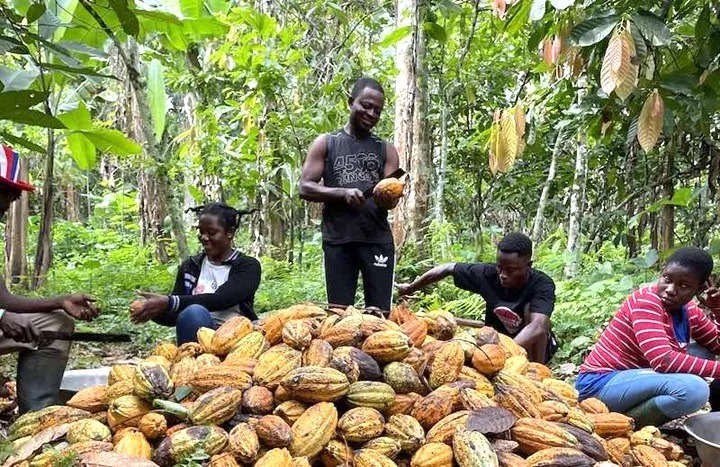President John Dramani Mahama’s recent visit to Côte d’Ivoire has injected fresh momentum into efforts to revitalize Ghana’s cocoa industry, a critical pillar of its economy.
The talks, centered on longstanding disparities in farmer earnings between the two West African neighbors, underscored the urgent need for structural reforms as global cocoa prices hover near historic highs of $7,915 per metric ton.
Ghana and Côte d’Ivoire, which collectively supply 65% of the world’s cocoa, have long grappled with contrasting pricing models. While Côte d’Ivoire’s semi-liberalized system allows farmers to benefit more directly from global price surges, Ghana’s rigid fixed-rate structure—enforced by the state-run Ghana Cocoa Board (COCOBOD)—has left its growers earning roughly 30% less. This imbalance has fueled rampant cross-border smuggling, with Ghanaian farmers and traders illicitly selling beans to Ivorian buyers for better returns.
During the talks, both nations reaffirmed commitments to the 2019 Cocoa Initiative, a pact designed to stabilize prices and improve farmer livelihoods. However, Ghana’s progress has been hampered by COCOBOD’s mounting debt and delays in securing annual syndicated loans, critical for pre-harvest financing. Mr. Issifu Issaka, National President of the Ghana Cooperative Cocoa Farmers Association, has publicly urged Accra to adopt a flexible pricing mechanism akin to its neighbors, arguing that “farmers cannot thrive under a system that ignores market realities.”
Brazil Enters the Frame
In parallel, Ghana is courting new alliances to modernize its cocoa sector. A recent agreement signed between COCOBOD, Brazil’s trade agency ApexBrasil, and the Brazilian Ministry of Agriculture signals a strategic shift toward leveraging global expertise. The partnership, finalized during a Brazilian presidential delegation’s visit to Accra, prioritizes technology transfer, joint research on disease management, and knowledge-sharing on cocoa flavor profiling—a move that could enhance Ghana’s premium bean exports.
Notably, Brazilian officials expressed interest in Ghana and Côte d’Ivoire’s Living Income Differential (LID), a $400-per-tonne sustainability premium added to cocoa sales. While the LID aims to bolster farmer incomes, critics argue its benefits are often diluted by middlemen and fluctuating global demand.
Challenges and Opportunities
The dual push for regional cooperation and global partnerships offers Ghana a chance to recalibrate its approach. Success would hinge on implementing market-driven reforms to close the earnings gap with Côte d’Ivoire, while adopting Brazilian agricultural technologies to combat yield-limiting threats like Cocoa Swollen Shoot Virus Disease (CSSVD).
Yet obstacles remain. COCOBOD’s financial instability continues to undermine investor confidence, and smuggling persists as a symptom of price disparities. Broader regional initiatives, including the Abidjan-Lagos transport corridor and the proposed ECOWAS single currency (ECO), could ease trade bottlenecks if realized, but progress remains slow.
For Ghanaian farmers, the stakes are existential. As global chocolate manufacturers face pressure to ensure ethical sourcing, Ghana’s ability to balance farmer welfare with market demands will determine its place in a rapidly evolving industry. As one Accra-based economist noted: “The world wants sustainably produced cocoa. Ghana must decide whether it wants to lead that charge—or watch others set the terms.”
The coming months will test whether these partnerships translate into tangible gains, or if systemic challenges once again overshadow the promise of reform.
